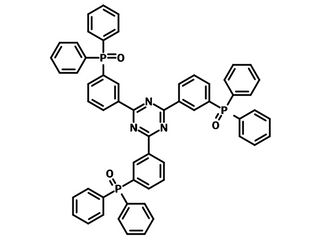PO-T2T
CAS Number 1646906-26-4
Charge Transport Layer Materials, High Purity Sublimed Materials, Host Materials, Materials,High purity PO-T2T, low price with additional savings for quantities of 5 g or more
Popular TADF host and exciplex material, also used as transport layer material in organic electronic devices, 2,4,6-tris[3-(diphenylphosphinyl)phenyl]-1,3,5-triazine, CAS No. 1646906-26-4
PO-T2T is an electron deficient semiconducting molecule with a triazine center and three diphenylphosphines.
Exciplex-forming with other electron donating host materials such as mCP, PO-T2T is a popular TADF host material with a high triplet energy level. The forming of exciplexes between mCP and PO-T2T is efficient, as is the energy transfer from such an exciplex to a blue phosphorescent dopant such as FIrpic. This enables triplet harvesting without energy loss.
Because of its electron-deficient nature with a deep highest occupied molecular orbital (HOMO = 7.55 eV), PO-T2T is also used as electron transport layer (ETL) / hole blocking layer (HBL) material in organic electronic devices.
Together with other electron donating materials, PO-T2T as universal exciplex hosts with improved device lifetime, efficiency and lower driving voltage.
| Guest | Exciplex Host | Color | Efficiencies | DOI |
| FIrPic | mCBP:PO-T2T | Sky-Blue Phosphorescent | EQE: 34.1% Max. PE: 79.6 lm W−1 |
10.1002/adma.201506065 |
| 4CzIPN | CBP:PO-T2T | Green TADF | EQE: 20.0% Max. PE: 62.1 lm W−1 |
10.1016/j.orgel.2019.06.001 |
| Ir(mphmq)2tmd | NPB:PO-T2T | Red phosphorescent | EQE: 34.1% Max. PE: 62.2 lm W−1 |
10.1021/acsami.6b14438 |
| 2CzPN, AnbTPA | CDBP:PO-T2T | White TADF | EQE: 19.2% Max. PE: 46.2 lm W−1 |
10.1016/j.orgel.2017.08.024 |
Highly efficient thermally activated delayed fluorescence (TADF) exhibiting high reverse intersystem crossing (RISC) yields by using PO-T2T as the acceptor unit to form exciplex emitting layer.
| Exciplex Emission Layer | Color | Efficiencies | DOI |
| DMAC-DPS:PO-T2T | 536 nm to 496 nm | EQE: 10.4–12.1% Max. PE: 24.2–39.5 lm W−1 |
10.1016/j.optmat.2020.110779 |
| MAC:PO-T2T | Green TADF | EQE: 17.8% Max. PE: 45.5 lm W−1 |
10.1002/adfm.201505014 |
| TSBPA:PO-T2T | Green TADF | EQE: 14.8% |
10.1021/acs.jpclett.8b03646 |
| Ir(ppy)3:PO-T2T | Red TADF | EQE: 5% | 10.3389/fchem.2019.00016 |
General Information
| CAS number | 1646906-26-4 |
|---|---|
| Chemical formula | C57H42N3O3P3 |
| Molecular weight | 909.80 g/mol |
| Absorption | λmax 272 nm (in DCM) |
| Fluorescence | λem 295 nm, 378 nm(in DCM) |
| HOMO/LUMO | HOMO = 7.55 eV, LUMO = 3.50 eV [1]; ET= 2.99 eV |
| Full chemical name | 2,4,6-Tris[3-(diphenylphosphinyl)phenyl]-1,3,5-triazine |
| Synonyms | POT2T |
| Classification / Family | Triazine derivatives, TADF exciplex co-host, phosphorescent organic light-emitting devices (PHOLEDs), TADF phosphorescent host, electron transport layer materials, sublimed materials |
Product Details
| Purity | Sublimed* >99.5% (HPLC) |
|---|---|
| Melting point | TGA 460 °C (0.5% weight loss) |
| Appearance | Off-white powder/crystals |
* Sublimation is a technique used to obtain ultra pure-grade chemicals. For more details about sublimation, please refer to the sublimed materials.
Chemical Structure
Device Structure(s)
| Device structure | ITO/MoO3(10 nm)/TAPC:MoO3 (20.0%, 50 nm)/CDBP (10 nm)/ dCDBP:PO-T2T:PO-01 (1:1, 0.3%, 20 nm)/PO-T2T (10 nm)/PO-T2T:Li2CO3 (3%,45 nm)/Li2CO3 (1 nm)/Al (100 nm) [2] |
|---|---|
| Color | White |
| Max. Current Efficiency | 88.7 cd/A |
| Max. EQE | 28.3 % |
| Max. Power Efficiency | 102.9 Im/W |
| Device structure | ITO/PEDOT:PSS (30 nm)/TPAC (20 nm)/mCP (15 nm)/ mCP:PO-T2T (1:1, 20 nm)/PO-T2T (45 nm)/Liq (1 nm)/Al (1 nm)/MoO3(5 nm)/DTAF (20 nm)/DTAF:PO-T2T (1:1, 20 nm)/PO-T2T(50 nm)/Liq (0.5 nm)/Al (100 nm). [3] |
|---|---|
| Color | White |
| Max. Current Efficiency | 27.7 cd/A |
| Max. EQE | 11.6 % |
| Max. Power Efficiency | 15.8 Im/W |
| Device structure | ITO/4% ReO3: mCP (60 nm)/ mCP (15 nm)/ CN-Cz2:PO-T2T (1:1 w%) (20 nm)/PO-T2T (10 nm)/CN-T2T (40 nm)/Liq (0.5 nm)/Al (100 nm). [4] |
|---|---|
| Color | White |
| Max. Current Efficiency | 37.8cd/A |
| Max. EQE | 16% |
| Max. Power Efficiency | 47.5 Im/W |
| Device structure | ITO/MoO3 (3nm)/TAPC (35 nm)/CBP:TTM-3PCz (3.0 wt %) (25 nm)/B3PYMPM (10 nm)/PO-T2T (70 nm)/LiF (0.8 nm)/Al (100 nm) [5] |
|---|---|
| Color | Deep-red, NIR |
| Max. EQE | 26.5% |
MSDS Documentation
Literature and Reviews
- An Exciplex Forming Host for Highly Efficient Blue Organic Light Emitting Diodes with Low Driving Voltage, J-H. Lee et al., Adv. Funct. Mater., 25 (3), 361-366 (2014); DOI: 10.1002/adfm.201402707.
- Precise Exciton Allocation for Highly Efficient White Organic Light-Emitting Diodes with Low Efficiency Roll-Off Based on Blue Thermally Activated Delayed Fluorescent Exciplex Emission, Z. Wu et al., Adv. Optical Mater., 1700415 (2017); DOI: 10.1002/adom.201700415.
-
The First Tandem, All-exciplex-based WOLED, W. Hung et al., Sci. Rep., 4, 5161 (2014); DOI: 10.1038/srep05161.

